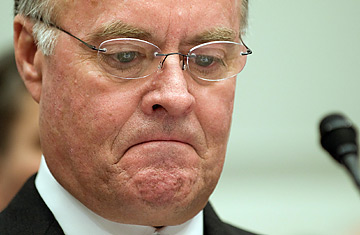
Bank of America CEO Ken Lewis
(2 of 2)
Some inconsequential fibbing by executives is allowed — just think of all the corporate bluster you get on business TV channels. Executives can state that they believe their company has the best employees or the best strategy, even if that turns out to be wrong. But when CEOs make statements that are deemed to mislead shareholders about the state of their business, that's a securities-law violation and can be considered a criminal offense. If it is determined that Lewis made statements himself or was responsible for directing the bank to make statements that misled shareholders, he could be facing fines or worse.
The SEC case against Bank of America — the one that was settled, but could now be revived — involves lying on a proxy statement. The good news for Lewis is that proxy fraud generally has lower penalties than regular securities fraud. The bad news is that the bar for proving that one lied on a proxy statement is much lower than for general securities fraud. In proxy fraud, the prosecution just has to prove that Lewis was negligent in not including certain information. The SEC does not have to prove, as is the case in regular securities fraud, that Lewis orchestrated a scheme to defraud investors. Poor judgment could be enough to get you in hot water in proxy fraud.
The SEC is only allowed to bring civil cases. So even if Lewis is found liable on proxy statements, there is no possibility of jail time. The SEC can bar individuals from being officers of public companies, which would put an end to Lewis' Bank of America career, but legal experts say a ban in a proxy case would be unusual. The size of any fine would be determined by how important the information withheld was deemed to be. Still, even a relatively minor misstatement or omission can lead to a finding of liability.
"It doesn't have to be something that moves the market to amount to proxy fraud," says Richard Painter, a law professor at the University of Minnesota. "Just has to be something that a reasonable investor finds important."
New York's Cuomo does have the authority to bring criminal cases involving securities violations under the Martin Act, which gives the attorney general of New York the power to prosecute financial fraud. And it is not unheard of for executives to go to jail for lying on a proxy statement. In the 1970s, in a famous Wall Street fraud case, the chief executive of National Student Marketing was sentenced to 18 months in jail for lying about the finances of a company National Student Marketing was acquiring. Yet Cuomo has typically stuck to bringing civil charges against executives and companies, and that is reportedly what he is considering in the Bank of America case.
Cuomo will have a higher bar to clear if he's looking for wrongdoing outside the proxy statements. In general securities-fraud cases, it must be proven that executives of a company knew that a piece of information was material and created a scheme to make sure shareholders didn't find out about it. Certainly if Lewis or others were found guilty of that they would face stiff penalties. What's more, judges typically are more likely to ban, at least temporarily, executives of financial-services companies who are found in violation of securities-fraud laws because it is considered to be more damaging to the credibility of the market. In the 1990s, several executives of Salomon Brothers were suspended from being officers of a securities firm after they failed to disclose big losses by one of the firm's bond traders.
"Every time you open your mouth to shareholders you potentially could violate securities laws," says Painter. "You need to be open and honest at all times."
Whatever the penalty, though, if Lewis is found to have lied about facts surrounding the Merrill merger, it is likely that the board will be forced to let him go. "Judge Rakoff is saying that executives need to be held accountable for the decisions they made," says Corporate Library's Minow. "I think heads will roll for this."
